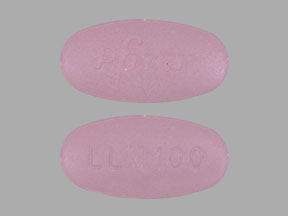Lorlatinib Disease Interactions
There are 8 disease interactions with lorlatinib.
- Atrioventricular block
- CNS effects
- Hepatotoxicity/hepatic impairment
- Hyperglycemia
- Hyperlipidemia
- Hypertension
- Interstitial lung disease
- Severe renal impairment
Lorlatinib (applies to lorlatinib) atrioventricular block
Moderate Potential Hazard, Moderate plausibility. Applicable conditions: Heart Block
PR interval prolongation and atrioventricular (AV) block can occur in patients receiving lorlatinib, with some reports of Grade 3 AV block that required a pacemaker placement. Patients at risk should have a ECG prior to initiating lorlatinib and should be monitored periodically thereafter. Withhold treatment and resume at a reduced dose or at the same dose in patients who undergo pacemaker placement. Permanently discontinue for recurrence in patients without a pacemaker.
Lorlatinib (applies to lorlatinib) CNS effects
Moderate Potential Hazard, Moderate plausibility. Applicable conditions: CNS Disorder, Depression, Psychosis, Sleep Disorder
A broad spectrum of central nervous system (CNS) effects can occur in patients receiving lorlatinib. These include seizures, hallucinations, changes in cognitive function, mood (including suicidal ideation), speech, mental status, and sleep. Overall, CNS effects occurred in as many as 54% of patients receiving lorlatinib with some requiring treatment discontinuation. Caution and close monitoring of patients with history of seizures or any mental or psychiatric illness is recommended.
Lorlatinib (applies to lorlatinib) hepatotoxicity/hepatic impairment
Moderate Potential Hazard, Moderate plausibility. Applicable conditions: Liver Disease
The recommended dose of lorlatinib has not been established for patients with moderate or severe hepatic impairment, therefore, caution is advised if using in these patients. Additionally, severe hepatotoxicity has been reported in patients with risk factors for hepatotoxicity (e.g., taking hepatotoxic drugs such as strong CYP3A inducers). Caution and close monitoring of hepatic function is advised.
Lorlatinib (applies to lorlatinib) hyperglycemia
Moderate Potential Hazard, Moderate plausibility. Applicable conditions: Diabetes Mellitus
The use of lorlatinib might cause hyperglycemia. It is recommended to assess and control fasting serum glucose prior to initiation of treatment and monitor periodically thereafter. Caution should be exercised when treating diabetic patients. Withhold and resume at a reduced dose or permanently discontinue treatment based on severity.
Lorlatinib (applies to lorlatinib) hyperlipidemia
Moderate Potential Hazard, Moderate plausibility.
Increases in serum cholesterol and triglycerides have been reported in patients receiving lorlatinib. Grade 3 or 4 elevations in total cholesterol occurred in 17% and Grade 3 or 4 elevations in triglycerides occurred in 17% of the patients enrolled in a clinical trial with up to 80% percent of patients requiring initiation of lipid-lowering medications. Caution is advised in patients with hyperlipidemias. Monitor serum cholesterol and triglycerides before initiating treatment and 1 and 2 months after initiating, and periodically thereafter. Initiation or increase of the dose of lipid-lowering agents might be required on these patients.
Lorlatinib (applies to lorlatinib) hypertension
Moderate Potential Hazard, Moderate plausibility.
The use of lorlatinib might cause hypertension. It is recommended to assess and control blood pressure prior to treatment initiation. Caution should be exercised when treating patients with prior history of hypertension, uncontrolled hypertension, and those at risk. Monitor blood pressure after 2 weeks and at least monthly thereafter during treatment. Withhold and resume lorlatinib at a reduced dose or permanently discontinue treatment based on severity.
Lorlatinib (applies to lorlatinib) interstitial lung disease
Moderate Potential Hazard, Moderate plausibility. Applicable conditions: Interstitial Pneumonitis
Patients treated with lorlatinib have reported severe, life-threatening, or fatal interstitial lung disease (ILD) and/or pneumonitis. It is recommended to investigate and monitor patients for pulmonary symptoms indicative of ILD/pneumonitis such as hypoxia, cough, dyspnea, or interstitial infiltrates on radiologic exams. Withhold therapy for for suspected ILD/pneumonitis and permanently discontinue therapy for treatment-related ILD/pneumonitis of any severity.
Lorlatinib (applies to lorlatinib) severe renal impairment
Moderate Potential Hazard, Moderate plausibility. Applicable conditions: Renal Dysfunction
The recommended dose of lorlatinib has not been established for patients with severe renal impairment. No dose adjustment is recommended for patients with mild or moderate renal impairment (creatinine clearance [CrCl] 30 to 89 mL/min estimated by Cockcroft-Gault).
Switch to professional interaction data
Lorlatinib drug interactions
There are 546 drug interactions with lorlatinib.
Lorlatinib alcohol/food interactions
There are 3 alcohol/food interactions with lorlatinib.
More about lorlatinib
- lorlatinib consumer information
- Check interactions
- Compare alternatives
- Side effects
- Dosage information
- During pregnancy
- Drug class: multikinase inhibitors
- Breastfeeding
- En español
Related treatment guides
Drug Interaction Classification
| Highly clinically significant. Avoid combinations; the risk of the interaction outweighs the benefit. | |
| Moderately clinically significant. Usually avoid combinations; use it only under special circumstances. | |
| Minimally clinically significant. Minimize risk; assess risk and consider an alternative drug, take steps to circumvent the interaction risk and/or institute a monitoring plan. | |
| No interaction information available. |
See also:
Further information
Always consult your healthcare provider to ensure the information displayed on this page applies to your personal circumstances.


